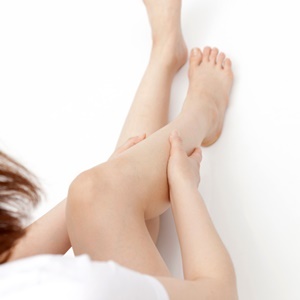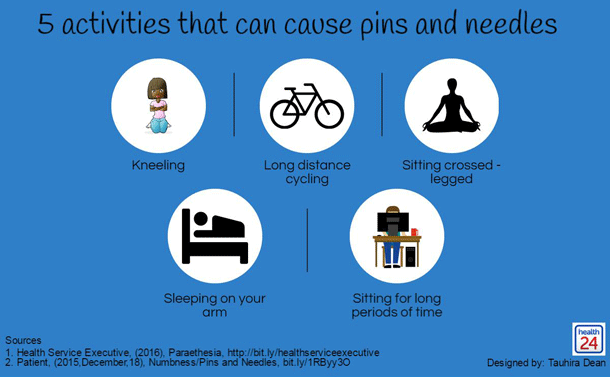
There you are, doing your couch potato thing with your feet up, watching a couple of your favourite back-to-back TV series. You suddenly notice cold numbness in your legs and feet, almost as if they’ve fallen asleep long before you. A ninja kick or two usually sorts the nasty numbness, but what is with the uncomfortable stinging, tingling prickly sensation that follows?
The exact mechanics behind this strange sensation most people call pins and needles is still uncertain, comments Stellenbosch University medical physiologist Dr Derick van Vuuren.
He says pins and needles (called parasthesia from the Greek word meaning "disordered perception”), usually happens when sensory nerves, especially ones involved with the perception of touch and pain, are compressed.
“The sensation itself is your body’s way of telling you that you need to relieve that compression,” he explains.
When you are most likely to get pins and needles

Constant pressure or compression on a sensory nerve and the loss of adequate bloody supply to nerves leads to temporary changes in cell membranes, Dr van Vuuren comments.
“These changes disrupt the ability of sensory nerves to carry minute electrical flashes or impulses (also called action potentials) between the brain and spinal cord or other parts of the body.”
Once you remove the compression, your sensory nerves respond by generating uncontrolled action responses in the form of pins and needles that shoot through the area as the nerve cells “wake up’ again.
When you really need to get off the couch (not just for a drinks refill)
Fortunately, parasthesia is harmless in most cases and the feeling passes after a few minutes.
There are however, sometimes more serious reasons for those ongoing pinprick sensations. They can be the result of a severe nerve injury or medical conditions like carpal tunnel syndrome, multiple sclerosis or diabetic neuropathy (when high blood sugar relating to diabetes causes damage to nerve fibres in the legs and feet).
That advises Dr van Vuuren, is why you should see your doctor if you have parasthesia that ‘persists for hours or days with no obvious cause, or when it happens with other symptoms like constant numbness in a limb.’
Chronic pins and needles can also be caused by other factors and conditions (yes, some are far scarier than that horror movie you watched last night). These include certain medications, exposure to toxic substances (like lead or radiation) and brain tumours caused by a central nervous system disorder.
Before you choke on your popcorn or rush to consult Dr Google, rather see your own doctor. He/she is the best person to do a physical exam, ask all the right questions about your medical history and possibly do a few tests to identify and diagnose the cause.
Treatment for chronic pins and needles will depend on the underlying cause. You may just need a simple lifestyle change. For painful pins and needles, your doctor may suggest medication to control the symptoms. If an underlying medical condition is the culprit, treatment will focus on controlling the treatment to ease the pins and needles.
Read: This new procedure could repair damaged nerves in days
Lastly, do not mess around if you feel a loss of power down the one side of your body. Seek immediate medical attention, as this could be a sign of a possible stroke.
What to do about temporary numbness or pins and needles
- Shake it off (with or without Taylor Swift), if you feel numbness or pins and needles after sitting, lying or leaning on your arm or leg for a long time
- Loosen up – wearing those fashionable skinnies or tight pointed shoes might look cool, but if they’re causing numbness/parasthesia, loosen them or better yet, take them off and slip into something loose and comfortable!
- Back or neck problems are more likely to put regular pressure on your nerves. Relieve this by not lifting heavy weights, avoiding repetitive movements, taking regular breaks from your desk and doing yoga or Pilates to improve poor posture.
- Cut down on alcohol – excessive alcohol can cause nerve damage.
- Eat a balanced diet to avoid vitamin B12 deficiency, which is known to cause nerve damage and anaemia.
Read more:
The science behind why we itch
How does the body respond to touching something hot?
Why do some amputees feel phantom limb pain?
Sources:
1. Dr Derick van Vuuren, Division of Medical Physiology, Faculty of Medical and Health Sciences, Stellenbosch University2. https://www.urmc.rochester.edu/encyclopedia/content.aspx?ContentTypeID=1&ContentID=58
3. http://www.rightdiagnosis.com/p/paresthesia/intro.htm
4. http://www.nhs.uk/conditions/pins-and-needles/Pages/Introduction.aspx
5. http://www.hse.ie/eng/health/az/P/Paraesthesia/Causes-of-pins-and-needles.html
6. http://patient.info/health/numbnesspins-and-needles




 Publications
Publications
 Partners
Partners










